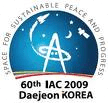Report from Washington, D.C.
Space Growth Can Build Overall National Capacity
Written by: developer
 Creating a locally grown space program could be a key to development and growth for low-income countries, according to one of two papers being presented this month by Space Foundation Research Analyst Mariel John at the 60th International Astronautical Congress (IAC) in Daejeon, South Korea.
Creating a locally grown space program could be a key to development and growth for low-income countries, according to one of two papers being presented this month by Space Foundation Research Analyst Mariel John at the 60th International Astronautical Congress (IAC) in Daejeon, South Korea.
Using the Nigerian space program as a case study, John looked at the interactions between space agencies and other institutions to determine if creating an indigenous space program contributed to overall advancement. She found significant connections with government, educational, and industrial institutions at the regional, national, and international level, including flow of knowledge between institutions, user-producer relationships, and movement of people from one institution to another. Her findings suggest that space programs build science and technology capacity and directly contribute to economic, social, and intellectual development.
Specific observations include:
- Educational connections seem to be the most prolific and most critical; for a space agency to thrive, it must develop partnerships with domestic universities and educational institutions as sources for qualified space professionals and venues for academic space research.
- International academic collaboration ensures ongoing connection - and benefit - from advances made by other nations. When local scientists and engineers conduct internationally recognized research and build scientific networks with foreign researchers, the opportunity for continued access to information and capabilities from other nations is enhanced.
- Obtaining foreign investment in an indigenous space program and income from the sale of space-derived products and services creates a new revenue stream, thus improving the economic health of the country.
- High-level government participation is required to effectively promote development through space activity; it may even be a prerequisite for the decision to pursue space activity as well as for focusing space policy on addressing national priorities.
- Having space capabilities and participating actively in international space forums gives a nation a voice in worldwide space policy.
- International cooperation seems to be a vital tool for ensuring continued development; foreign partners willing to share costs and lend expertise allow developing countries to create more advanced space systems than would be possible otherwise.
Hosted by the International Astronautical Federation (IAF), the IAC is a well-established and well-respected conference that attracts an average of 1,500 participants each year, including members of the global space industry, academic researchers, and students from around the world. The week-long event hosts more than 100 technical sessions, allowing attendees to gain knowledge about current space projects, programs, and related technologies. The theme for the Oct. 10-12, 2009, Congress is Space For Sustainable Peace and Progress.
This article is part of Space Watch: October 2009 (Volume: 8, Issue: 10).
